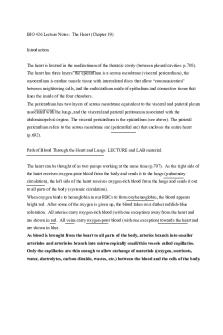Bellah 4-12-2018 - Summary Habits of the Heart PDF

| Title | Bellah 4-12-2018 - Summary Habits of the Heart |
|---|---|
| Course | Civil Society& Modern Politics |
| Institution | Miami University |
| Pages | 1 |
| File Size | 59.7 KB |
| File Type | |
| Total Downloads | 56 |
| Total Views | 136 |
Summary
Reading summary for this book. ...
Description
Jacob Bruggeman Dr. Danoff POL 419/519 April 12, 2018 Robert Bellah, Habits of the Heart, Preface (xli-xlvii), 3-51, 55-62 For this assignment, you will write 150-300 words on the following questions: What did you find most persuasive or valuable about the author's argument, and why? On the other hand, what did you find most problematic or troubling about the author's argument, and why? Your response should include at least one quotation from the reading. The quotation does not count as part of your required word total (150-300 words). Quotations must be taken from the assigned version of the readings and must be cited. To cite your quotations,you should simply put the page number in parentheses after the quotation. (Nothing else is needed as I already know what your source is, as you are required to use the assigned versions of the readings.) No late submissions will be accepted. Your response must be turned in as text (not as an attachment). See the Rubric (below) for more detail on how this assignment will be graded. Reading Habits of the Heart: Individualism and Commitment in American Life by Robert H. Bellah et al. is, in many ways, taking a step back from our course’s progression. Written decades before Putnam’s positions on social capital were elucidated in Bowling Alone or Our Kids, and just a long before the publication of many of the shorter readings we’ve engaged with, Habits of the Heart hones-in on something that predates the social ills and proverbial problems in the public square that our other authors are concerned with, something that reaches back to the founding: individualism. Much talked about in our discussions of Tocqueville, individualism has since taken a sideline to other discussions, and so I’m glad to have our discussion of individualism and its “common moral vocabulary” reenter our debates (Bellah et al., 20). I found this reading to be strikingly poignant, and I particularly liked the distinction between “utilitarian individualism” and “expressive individualism,” for I think it brilliantly distinguishes between many of today’s social issues. Frankly, my only critique of the reading is that I wish the authors spent more time addressing the cultural implications of leaving home, or perhaps the cultural products (think James Deen’s “Rebel Without a Cause”) that address this issue....
Similar Free PDFs

Heart of darkness summary
- 8 Pages

The Anatomy of the Heart
- 4 Pages

Ballad of the mother\'s heart
- 10 Pages

Habits of unsuccessful students
- 3 Pages

Davis - Labors of the Heart
- 11 Pages

BIO 426- The Heart summary notes
- 6 Pages

Heart Sounds - Summary Medicine
- 2 Pages

Parental Habits of polar bears
- 3 Pages

Lecture 11 - Study of the heart
- 4 Pages

The Tell-Tale Heart
- 8 Pages
Popular Institutions
- Tinajero National High School - Annex
- Politeknik Caltex Riau
- Yokohama City University
- SGT University
- University of Al-Qadisiyah
- Divine Word College of Vigan
- Techniek College Rotterdam
- Universidade de Santiago
- Universiti Teknologi MARA Cawangan Johor Kampus Pasir Gudang
- Poltekkes Kemenkes Yogyakarta
- Baguio City National High School
- Colegio san marcos
- preparatoria uno
- Centro de Bachillerato Tecnológico Industrial y de Servicios No. 107
- Dalian Maritime University
- Quang Trung Secondary School
- Colegio Tecnológico en Informática
- Corporación Regional de Educación Superior
- Grupo CEDVA
- Dar Al Uloom University
- Centro de Estudios Preuniversitarios de la Universidad Nacional de Ingeniería
- 上智大学
- Aakash International School, Nuna Majara
- San Felipe Neri Catholic School
- Kang Chiao International School - New Taipei City
- Misamis Occidental National High School
- Institución Educativa Escuela Normal Juan Ladrilleros
- Kolehiyo ng Pantukan
- Batanes State College
- Instituto Continental
- Sekolah Menengah Kejuruan Kesehatan Kaltara (Tarakan)
- Colegio de La Inmaculada Concepcion - Cebu





